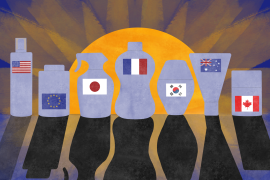Investing in Sexual, Reproductive Health Results in Medical Benefits, Lives Saved, Report Says
Investing in women's sexual and reproductive health services results in "huge returns" in medical benefits and lives saved, according to a report released on Tuesday by the Allan Guttmacher Institute and UNFPA, Reuters reports. The report, titled "Adding it Up: The Benefits of Sexual and Reproductive Health Care," is the first of its kind to examine research on the return on investment in sexual and reproductive health programs from the previous 25 years, according to Reuters (Reaney, Reuters, 2/3). The report focused on the societal and individual impact of three "key" areas, including the prevention, diagnosis and treatment of sexually transmitted diseases, including HIV/AIDS; maternal health; and contraceptive services and supplies to prevent unintended pregnancies (AGI release, 2/3). Both the U.N. Millennium Development Goals set in 2000 and targets set at the 1994 International Conference on Population and Development in Cairo, Egypt, aimed to provide family planning options and education to prevent unwanted pregnancies as a way to reduce world poverty and hunger and improve women's rights in developing countries (Kaiser Daily Reproductive Health Report, 1/15). The report found that in 2000, developed countries provided $2.6 billion for sexual and reproductive health services, which is less than 50% of the amount those countries pledged at the conference to be giving by that time (Kirby, BBC News, 2/3). The report says that providing reproductive and sexual health services for the 200 million women throughout the world who need them would cost $3.9 billion per year, according to Reuters. However, providing the services could prevent annually 1.5 million maternal and infant deaths, 52 million unintended pregnancies and 505,000 children from becoming orphans, the report says (Reuters, 2/3).
Recommendations
The report calls on developed countries to fulfill the pledges made at the Cairo conference, the AP/Long Island Newsday reports (Wardell, AP/Long Island Newsday, 2/3). The report says that more than 75% of spending on reproductive and sexual health services is currently provided by "individuals, governments and nongovernmental organizations in developing countries," and although "developing countries must continue investing ... it is time for developed countries to live up to the pledges they made at the 1994 conference" (BBC News, 2/3). AGI President Sharon Camp said, "Governments are not recognizing the importance to long-term development goals from investment in this area. We have seen greater awareness of the need to address the AIDS epidemic but that's only on[e] piece of the picture" (AP/Long Island Newsday, 2/3). She added, "Our report makes it clear that the global community can well afford to make the additional investment needed to close the gap in sexual and reproductive health." UNFPA Executive Director Dr. Thoraya Obaid said, "Money invested in sexual and reproductive health services will be repaid many times over." Camp also said, "We hope [the report] will reach the Bush administration and also members of the U.S. Congress who appropriate funds. We also hope it will reach European donor governments. Even though they are doing better than the United States in meeting their pledges, none of them are where they committed to be in 1994" (Reuters, 2/3).






